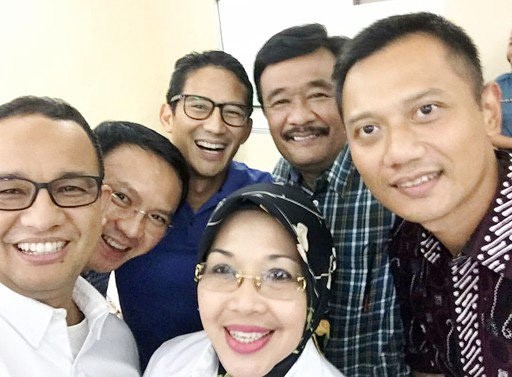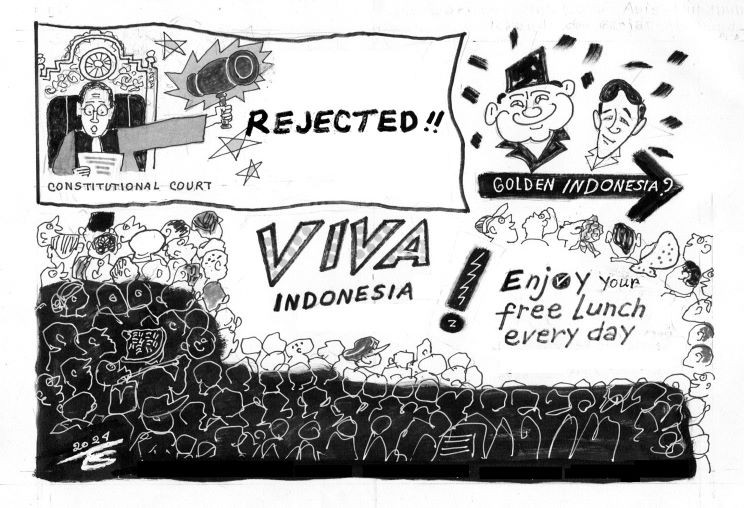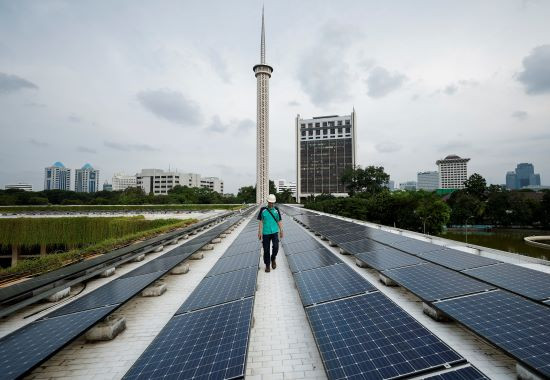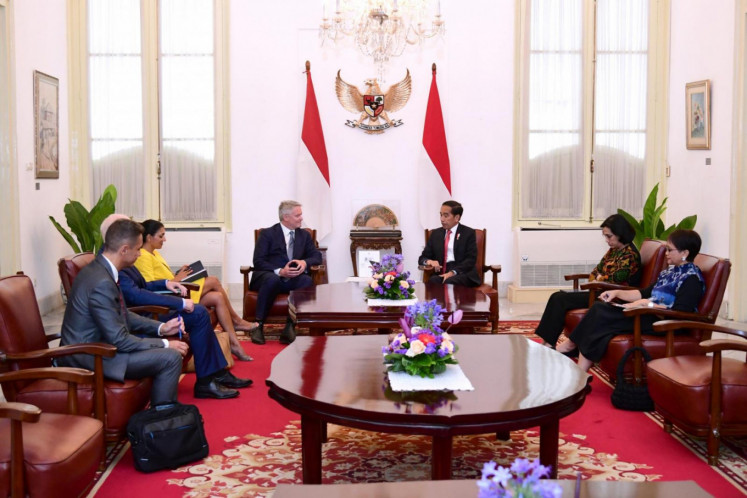Let’s scrutinize Jakarta’s triple-A candidates
Change Size
 Smile: Former culture and education minister Anies Baswedan (far left), one of the candidates in the 2017 Jakarta gubernatorial election, takes a group photo with other candidates during a break from a mandatory medical examination on Saturday. (Courtesy of Instagram/-)
Smile: Former culture and education minister Anies Baswedan (far left), one of the candidates in the 2017 Jakarta gubernatorial election, takes a group photo with other candidates during a break from a mandatory medical examination on Saturday. (Courtesy of Instagram/-)
J
akarta voters are fortunate to have three choices for governor and vice governor in the February election despite a tough selection process. Because of the popularity of Governor Basuki “Ahok” Tjahaja Purnama and high public expectations, political parties were made labor to name their best candidates to rival the incumbent.
Ahok may be a runaway leader, but he can no longer rely solely on his integrity to win the election as he will face former national education and culture minister Anies Baswedan, whose integrity is equally unquestionable.
Meanwhile, the nomination of Agus Harimurti Yudhoyono, a new kid on the block in practical politics, surprised many. But his lack of political contamination, his youth and military career may offer an alternative to those who are not
impressed with the other two candidates.
Ahok and his running mate, Jakarta Deputy Governor Djarot Saiful Hidayat, enjoy the most political backing, with four parties — the Indonesian Democratic Party of Struggle (PDI-P), the Golkar Party, the NasDem Party and the Hanura Party — endorsing their nomination.
The PDI-P’s last minute decision to back Ahok and Djarot has changed the political landscape of the Jakarta gubernatorial election, as members of the Kinship Coalition that had previously pledged to join forces to beat Ahok parted ways.
Former president Susilo Bambang Yudhoyono gathered leaders of his Democratic Party, the United Development Party, the National Awakening Party and the National Mandate Party and eventually named Agus, Yudhoyono’s eldest son, their gubernatorial candidate and assistant to the governor for tourism and culture Sylviana Murni his running mate.
Gerindra and the Prosperous Justice Party (PKS) went ahead with their plan to nominate young businessman Sandiaga Uno, not as the gubernatorial candidate but as the running mate of Anies.
It is just a coincidence or destiny that the first names of the three gubernatorial candidates begin with “A” and their running mates’ first or second names start with the letter “S”. Whatever this might mean, the Feb. 15, Jakarta election will be a high-level political event that will require voters to think carefully before making up their minds on who to vote for or risk falling victim to the power play.
Most voters have already formed an opinion of Ahok. They have learned from his performance over the last two years or so in leading the city. Ahok himself even feels that he does not need to campaign because people already know him.
Ahok will likely highlight his success stories to lure voters, especially the Jakarta Smart Card (KJP) and the Jakarta Health Card (KJS), which were introduced when he was deputy to Joko “Jokowi” Widodo, now the president. Ahok will also point out the improvements he has made in public services, the development of dozens of integrated child-friendly public spaces (RPTRAs) and the deployment of new buses along Transjakarta lanes.
His rivals, however, will raise a number of issues that have rendered Ahok a target of criticism and protest, like evictions, non-budgetary funds collected from private companies, land reclamation in Jakarta Bay and low disbursement of the city budget.
For Anies, his participation in the election will require him to prove he is more than an educator and former minister. He has to offer realistic but convincing programs to solve the acute problems of flooding, traffic congestion, lack of housing for the poor and garbage treatment.
He will be challenged to find ways to empower the informal sector, in which many people make a living but also cause concern because of their occupation of public facilities like sidewalks. Sandiaga should do his part by formulating programs to help micro, small and medium enterprises grow.
It seems that Anies also needs to answer voters’ curiosity about the real reasons behind his exit from the Cabinet. For Sandiaga, the toughest question he will face is him being listed in the Panama Papers, a series of leaked documents containing information about wealthy individuals with wealth parked in offshore company structures.
Although he has claimed that none of his offshore companies was intended to hide illegal activities, many are likely to think otherwise.
As a contender, Agus will face an equally tough test. He will have to study a lot about urban matters. He cannot simply rely on Sylviana, a former Central Jakarta mayor, to address the commonly asked questions because voters will want to know his platform and programs.
Most Jakarta voters know very little about Agus, who will have to move out of the shadow of his father, former president Yudhoyono. It will surely be an uphill challenge for Agus to convince voters that he deserves the gubernatorial position, simply because his lack of exposure to public services.
With balloting still four and a half months away, voters have ample time to scrutinize the track record of each candidate. Barring any unforeseen administrative defects, the three tickets will enliven the fiesta of democracy.
___________________________________
The author is a staff writer at The Jakarta Post.









